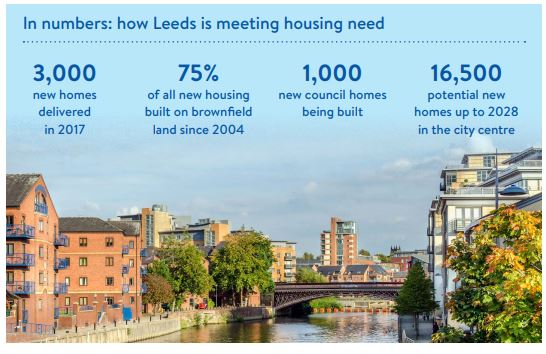Our guest blog is from Maggie Gjessing, Head of Housing Growth, Asset Management and Regeneration, Leeds City Council, who discusses the city’s inclusive growth strategy.
The Leeds Inclusive Growth Strategy has at its heart the objective of delivering growth that reduces inequality in the city and boosts economic performance. It sets out how the council, the private sector, universities, colleges and schools, the third sector and social enterprises in the city will work together to grow the Leeds economy. The aim is to ensure that everyone in the city contributes to, and benefits from, growth to their full potential.
Our core strategy, which was adopted in November 2014, outlines the city’s housing growth principles. This includes ensuring growth targets reflect local need in terms of tenure, type and size in the context of a growing population, while protecting the quality of the environment and respecting community identity.
Housing need
The City Council’s housing strategy further articulates the inclusive growth challenge. The strategy sets out the aim of “effectively meeting affordable and social housing need, promoting independence and creating sustainable communities”. It clearly outlines the need for social rented housing in the city, with almost 24,000 applicants on the Leeds Homes Register in 2016 (see picture below).

Leeds has been proactive in leading and shaping delivery. Government figures released in February show that Leeds was one of just three local authority areas across the country to see the delivery of more than 3,000 new homes in 2017. A key opportunity for sustainable growth is the considerable brownfield capacity in Leeds. The development plan for the city has a clear brownfield-first policy and since 2004 more than 75% of all new housing in the city has been built on brownfield land.
The city has recently successfully attracted resources through the housing infrastructure fund to support the delivery of a vibrant mixed community in the city centre, with the potential to realise more than 16,500 new homes up to 2028. The City Council is a significant developer in its own right with a 1,000-unit programme of new council housing which is well over halfway through delivery. This includes a major mixed-tenure extra care project and the council is now gearing up to take advantage of the new housing revenue account borrowing freedoms recently announced in the Budget Statement.
Empty Homes
The council also has an empty homes strategy which includes a programme of acquisitions to bring long-term empty properties back into use as council housing. The focus of the programme has been purchasing properties that had been left empty and are causing a blight within neighbourhoods. We work closely with Homes England and our partner housing associations, offering tailored, multi-disciplinary support to bring forward sites, helping our partners commit their investment strategies and minimise development risk.
Funding development
As part of the strategic use of its resources, the council uses its receipts to provide grants to housing associations and third sector providers. This has included a programme of developing bespoke new homes to meet the needs of families with specific access or mobility requirements. A recently developed approach to offering development finance through affordable loans alongside grant support for providers, further illustrates the council’s ongoing innovative approach to delivering new homes.
To discuss the issues raised in this article, contact: maggie.rafalowicz@campbelltickell.com
This article also appears in CT Brief, Issue 35
Maggie Gjessing will also be joining a panel of speakers at Campbell Tickell’s joint breakfast seminar with Bevan Brittan on 27th June at CIH Manchester! Click to find out more.



